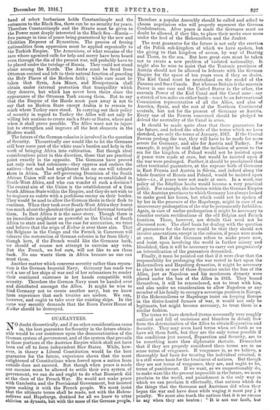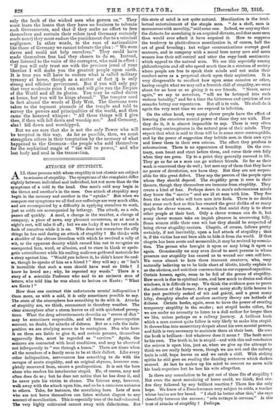GUARANTEES.
NO doubt theoretically, and if no other considerations came in, the best guarantee for Security in the future obtain- able would be our insistence upon the democratization of the German system of government, and of the system that prevails in those portions of the Austrian Empire which shall not have been cut off to form independent Slav States. While, how- ever, in theory a Liberal Constitution would be the best guarantee for the future, experience shows that the most enlightened of Constitutions when forced upon a nation from outside does not succeed. But though when peace is made our enemies must be allowed to settle their own system of government, we can do and ought to do what Bismarck did at the close of the French War. He would not make peace with Gambetta and the Provisional Government, but insisted upon making it with the French people. We must insist that the ultimate terms shall be made, not with the Hohen- zollerns and Hapsburgs, destined for all we know to utter oblivion as dynasts, but with the mass of the German people. Therefore a popular Assembly should be called and asked to choose negotiators who will properly represent the German Confederation. After peace is made the Germans must no doubt be allowed, if they like, to place their necks once more under the heel of the Hohenzollern and the Junker.
The next guarantee for the future is not only the erection of the Polish sub-kingdom of which we have spoken, but the giving to that kingdom of access, by way of Dantzig and Thorn, to the sea. But here great care, must be taken not to create a new problem of violated nationality. It might also be wise to insist that the Teutonic provinces of Austria should not be allowed to federate with the German Empire for the space of ten years even if they so desire. The Kiel Canal must be neutralized on the model of the Panama and Suez Canals. But whereas Britain is the suzerain Power in one case and the United States in the other, the suzerain Power of the Kiel Canal and the Canal zone—say a stretch of ten miles on either-bank—must be an International Commission representative of all the Allies, and also of America, Spain, and the rest of the Northern Continental neutrals, but not for the present of Germany or Austria. Every one of the Powers concerned should be pledged to defend the neutrality of the Canal in arms.
It should be made quite clear that these guarantees for the future, and indeed the whole of the terms which we have sketched, are only the terms of January, 1917. If the Central Powers prolong the war, they will have to be made far more severe for Germany, and also for Austria and Turkey. For example, it might be said that the inclusion of access to the sea for the kingdom of Poland would not be insisted upon if peace were made at once, but would bo insisted upon if the war were prolonged. Further, it should be proclaimed that other territorial guarantees, at the expense both of Germany in East Prussia and Austria in Silesia, and indeed along the whole frontier of Russia and Poland, would be insisted upon later—i.e., if peace were not made at once. In a word, our policy of the Sibylline books would become a very practical policy. For example, the inclusion within the German Empire of the Austrian provinces to which Germany has always looked to make good her losses, but which could not be spoken of by her in the presence of the Hapsburgs, might in case of an unnecessary prolongation of the war be permanently forbidden. Again, in case of undue prolongation it might be necessary to consider certain rectifications of the old Belgian and French frontiers. These, however, are details that need not be discussed now. The chief basis for dealing with the question of guarantees for the future would be that they should not involve annexations, except in the colonies, if peace were made at once. But if the Germans refuse to make peace now, and insist upon involving the world in further misery and bloodshed, then it will be necessary to carry out progressively an intensification of the guarantees demanded. Finally, it must be pointed out that if it were clear that the responsibility for prolonging the war rested in fact upon the Hohenzollern and Hapsburg dynasties, it might be necessary to place both or one of those dynasties under the ban of the Allies, just as Napoleon and his mushroom dynasty were placed under the ban of the Allies in 1815. They bound themselves, it will be remembered, not to treat with him, and also under no consideration to allow Napoleon or any member of his family to occupy a sovereign position in Europe. If the Hohenzollern or Hapsburgs insist on keeping Europe in the thrice-heated furnace of war, it would not only be legitimate, but might become necessary, to treat them in .a similar fashion.
The terms we have sketched (terms necessarily very roughly outlined and full of omissions and blunders in detail) flow from the determination of the Allies to obtain Reparation and Security. They may seem hard terms when set forth as we have set them forth, but they are the only terms possible if the conditions just named, Reparation and Security, are to be something more than diplomatic rhetoric. Remember that if they are properly considered these terms are in no sense terms of vengeance. If vengeance is, as we believe, a thoroughly bad basis for treating the individual criminal, it is a still worse basis for the treatment of nations. But though they are not terms of vengeance, they are, and ought to be, terms of punishment. If we want, as we unquestionably do, to make wars like the present impossible in the future, we must proclaim to the world, and punishment is the only way in which we can proclaim it effectually, that nations which do the things that the Germans and Austrians did when they began the war and have done while waging it must pay ; to penalty. We must also teach the nations that it is no excuse to say when they are beaten : " It is not our fault, but only the fault of the wicked men who govern us." They must learn the lesson that they have no business to tolerate such Governments, and that if they make no effort to free themselves and restrain their rulers (and Germany certainly made none) they must endure the punishment due to a criminal negligence. In other words, in the case of nationalities like those of Germany we cannot tolerate the plea : • " We were slaves and could not help ourselves." They could have made themselves free had they chosen to do so. Instead, they listened to the voice of the corruptor, who said in effect : " If you will only trust me with the precious jewel of your liberties I will make you the greatest people upon earth. It is true you will have to endure what is called military tyranny at home, though as a matter of fact it is only strong and efficient government. But if you will only pay that very moderate price I can and will give you the Empire of the World and all its glories. You may be called slaves at home, but you will be kings abroad." The tempter used in fact almost the words of Holy Writ. The Germans were taken to the topmost pinnacle of the temple and told to survey the powers and principalities of the world, and then came the honeyed whisper : " All these things will I give thee, if thou wilt fall down and worship me." And Germany, alas 1 fell down and worshipped.
But we are sure that she is not the only Power who will be tempted in this way. As far as possible, then, we must strengthen others in their temptation by the memory of what happened to the Germans—the people who sold themselves for the sophistical magic of " the will to power," and who lost body and soul in the transaction.



























 Previous page
Previous page